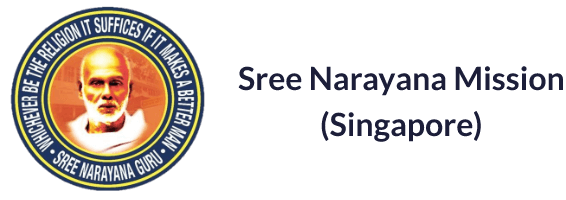R Asokan – Our Family, Our Service to the Mission
Our Family, Our Service to the Mission
Asokan Raghavan
“Without the Mission, my family would have been different,” Asokan Raghavan declares.
His family’s association with the Sree Narayana Mission spans decades, from the 1950s, when his parents were active members, particularly in cultural events. “Mum was always involved in the Mission, in the singing and drama,” Ambika Raghavan shares. Their father had been a leading member of the Mission’s Cultural Committee. Mohandas Raghavan recalls, “A family outing would be to the Mission. On Sundays, we’d dress up and go there. We looked forward to that, because in those days of ‘kampung’ life, there were not many things to do. Sometimes, we even took a taxi to the Mission. So, it was very thrilling”.
The seven children in their family saw the Mission as their second home and the members as their extended family. “The Mission was very supportive and got the family more settled in Singapore. The members were always coming to our house, singing and recording songs,” Mohandas remembers. Like family, the Mission had been there for them in their time of need, “They financed Mum’s funeral and they also gave me a study loan for my university course in Australia,” Mohandas adds.
The exposure to the Mission during their impressionable years had left an indelible mark on the siblings. Ashokan has taken Sree Narayana Guru’s teachings to heart, “His words like, ‘Gain freedom through knowledge, strength by organisation,’ had a profound impact on me. These have been core values to me. The children of the members who did well in school and life became our role models. Mum never wavered in her beliefs and service to the Mission, so all of us grew up with that belief. Twice a week, from 5.30 to 10 pm, she’d be at rehearsals in the Mission with Dad, and since there were people who felt Mum is doing it for a good cause, they didn’t mind looking after us at home”.
The virtuous cycle of service that the siblings witnessed in the adults around them instilled the same values in their own psyche. Ashokan revealed, “Dad was a storekeeper in the British Ordinance Department and earning a meagre salary of $400 monthly, for all of us. Despite that, what helped us go forward were the values of the Mission. He made sacrifices for the Mission and made do on the meagre salary. It bonded us, to make sacrifices for the good of the organisation. I became a Life Member in January 1972, with the salary I received from National Service upon my promotion to Lance Corporal – I paid $50,” and he has continued serving the Mission. “It was drummed into us, that, no matter how poor, you must share with people – even if you have one slice of bread, share. We went to the Mission’s Home for the Aged and I learnt the value of empathy for people,” Ambika adds. Like Ashokan, she too continues to serve the Mission, even after moving to Perth, Australia, by editing its publications. Mohandas had picked up subtle lessons from the way the Mission was run, “It was important to be clean, studies and education is important. There was food after activities and we learnt to serve food”. He, too, has served the Mission on its Ex-Co and in other capacities.
“All of us are inspired by the Guru’s teachings; the family is united, there is a bonding among us,” says Ashokan. “We never strayed from the Guru’s tenet, ‘One in kind, one in faith, one in God, is man’ and as a family we are united in the same way of thinking,” Ambika explains. Mohandas sums it up, “We are all over the world but we are very close,” attesting to the strong ties that develop when families make the Mission part of their extended home and family.


